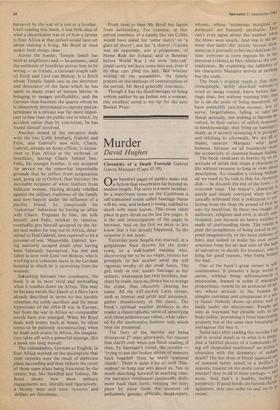Murder
David Hughes
Chronicles of a Death Foretold Gabriel Garcia Marquez (Cape. £5.95)
("Nile hundred pages of quality make this V a fiction that reverbrates far beyond its modest length. The story is a mere incident. In a waterfront town on the Caribbean a self-contained youth called Santiago Nasar will be, was, and indeed is being, stabbed to death with meat knives. This event takes place in gory detail on the last few pages. It is the sole preoccupation of the pages in between. And on the first we more or less know that it has already happened. So the suspense is not acute.
Yesterday poor Angela was married, at a gargantuan feast thrown for the entire town, to a well-heeled outsider who, discovering her to be no virgin, returns her promptly to her mother amid the still vigorous revelry of the small hours. The girl, truly or not, names Santiago as her seducer, whereupon her twin brothers, but- chers by trade, have no choice but to avenge the crime, thus obscurely clearing her name. All the stiff-necked Latin virtues, such as honour and pride and innocence, gather thunderously in the dawn. The book's spiritual weather produces in the reader a claustrophobic sense of identifying with those preposterous values, while reliev- ed by the unobtrusive humour with which they are presented.
The facts of the murder are being disinterred 27 years afterwards, for reasons that clarify only when you finish reading, if then, by Santiago's friend, the novelist 'trying to put the broken mirror of memory back together from so many scattered shards'. There is quite a lot of such `Dur- realism' to keep our wits about us. Not so much marching forward as marking time, the narrative continuum continually drifts more back than forth, rescuing the story piece by piece from the memory of policemen, gossips, officials, shopkeepers, whores, whose 'numerous marginal ex- periences' are humanly unreliable. They can't even agree about the weather when the blows were struck. And that is the ele- ment that melts this strictly factual docu- ment (as it pretends to be) into delicious fic- tion: everyone in town regards his or her personal evidence as fact, whatever the con- tradictions. By exploiting the fallibility of his characters Marquez arrives at nothing but the truth.
The book's original touch is that these townspeople, deftly sketched without a word or image wasted, know before San- tiago does, but without warning him, that he is on the point of being murdered. All have ostensibly cast-iron excuses. loss of nerve, forgetfulness, failing to take the threat seriously, not wishing to become in- volved. In their variety of selfish responses to foreknowledge, they bring on Santiago's death, as if secretly savouring it in pro'sPect and relishing its aftermath. We are all to blame, mutters Marquez with good humour, because we all brainlessly share the eccentricity of common human feeling. The book vindicates its brevity by an ex- actitude of detail that snaps a character to life without recourse to long or even direct description. To visualise a visiting bishoP, all we need to be told is that his favourite dish — he discards the rest of the fowl — is coxcomb soup. The mayor's character is purely and simply conveyed when we are casually informed that a policeman is CO1‘ lecting from the shop the pound of liver he eats for breakfast. In these two images all authority, religious and civil, is nicely Con founded, just because no heavy weather is made of confounding them. The reader i5 paid the compliment of being asked to res- pond imaginatively to the most delicate 01 hints and indeed to make his own moral structure from the ins and outs of the lack of narrative: to decide for instance, who is lying for good reasons, who being honest for bad. One of the book's great virtues is self" containment. It presents a large world in parvo, without being selfconsciously a microcosm, framed in noble if miniature proportions, viewed by an aristocrat of let" ters whose attitude to the human 10t mingles contempt and compassion in a wit" ty blend. Nobody shows up either well or badly under the microscope. People are seen as wayward but pitiable cells in the body politic, preventing it from functioning properly but at the same time breathing all outrageous life into it. Some days after reading this novella I 0 still in several minds as to what it is about. Just a faithful picture of a community ing off shopsoiled machismo? an author's obsession with the dramatics of sudden death? The last drop of blood squeezed out of material better suited to a thriller? A neurotic treatise on the erotic corollaries of murder? Any or all of these perhaps —and more. And that's a healthy feeling ° perplexity. If good books do furnish the im- agination, they also echo on and on in its rooms.


































 Previous page
Previous page